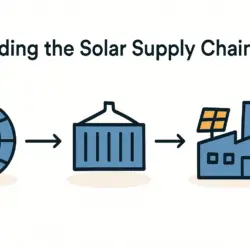Expanding Ghana’s Renewable Energy Access
Ghana has embarked on an ambitious journey, launching a groundbreaking $85 million renewable energy programme to electrify 400 rural communities across 10 regions. Backed by the Swiss government, this transformative initiative is set to transform energy access in some of the country’s most underserved areas, providing a beacon of hope and progress.
The programme will extend electricity to communities in the Ashanti, Bono, Bono East, Central, Eastern, Greater Accra, Northern, Oti, Upper East, and Upper West regions. Many of these communities currently depend on environmentally harmful energy sources that contribute to carbon emissions. This initiative will help these communities transition to clean and sustainable energy solutions.
At the launch in the Savannah Region, Ghana’s Vice President, Dr. Mahamudu Bawumia, highlighted the programme’s importance. He emphasized its alignment with Ghana’s broader goals of reducing carbon emissions and enhancing energy efficiency. The initiative marks a major step towards a cleaner, more sustainable future for the nation.
A Game Changer for Rural Electrification
The programme’s focus on renewable energy is particularly noteworthy. Although Ghana has made substantial progress in electrification—with 89.3% of the population now having access to electricity—the country’s integration of renewable energy remains limited.
In 2020, renewable energy accounted for a mere 0.76% of Ghana’s energy mix, a stark contrast to the national target of 10%. This new initiative is expected to significantly raise the share of renewable energy in the country’s total energy consumption. For more on Ghana’s solar projects, see Ghana solar projects: 35 Amazing Mini-Grid Initiatives Transforming.
The Vice President highlighted that this programme is a crucial step toward achieving Ghana’s goal of universal access to electricity by 2025. It will also help the country fulfill its international commitments to reduce greenhouse gas emissions. Ghana has set an ambitious target of reducing carbon emissions by 64 million tonnes by 2030, and this Ghana rural electrification project is a key part of that effort.
Financial and Environmental Benefits of Renewable Energy
The programme offers more than just expanded access to electricity; it also provides substantial financial and environmental benefits. By transitioning from fossil fuels to renewables, Ghana can significantly reduce its carbon footprint, showcasing the powerful environmental benefits of solar energy and contributing to global efforts against climate change.
The initiative has garnered international acclaim for its pioneering approach. The Global Carbon Council’s approval of the programme—the first of its kind in West Africa—highlights its potential for significant impact. The Swiss government’s support reflects its commitment to meeting the climate goals set forth in the Paris Agreement.
Dr. Bawumia expressed optimism that the programme would serve as a model for other West African countries. He noted that the project’s endorsement by the Global Carbon Council affirms its potential for meaningful change. The Vice President also commended the private sector’s role in making the programme a reality, acknowledging its dedication to expanding rural electrification and promoting renewable energy.
Future Prospects for Renewable Energy Development in Ghana
The launch of this rural electrification programme marks a pivotal milestone in Ghana’s journey toward sustainable development. By delivering clean energy to rural communities, the initiative will improve living standards and create new economic opportunities.
Furthermore, the programme is expected to catalyze additional investments in renewable energy. As Ghana continues to develop its energy infrastructure, prioritizing clean and sustainable sources will be crucial for the nation’s long-term success. For insights into Ghana’s solar panel manufacturing landscape, visit Ghana Solar Panel Manufacturing Report | Market Analysis.
This $85 million renewable energy programme represents more than just an electrification project—it is a bold step toward a greener, more sustainable future for Ghana. With the backing of international partners and the steadfast commitment of the government, the initiative is set to transform the energy landscape in rural Ghana and beyond.



